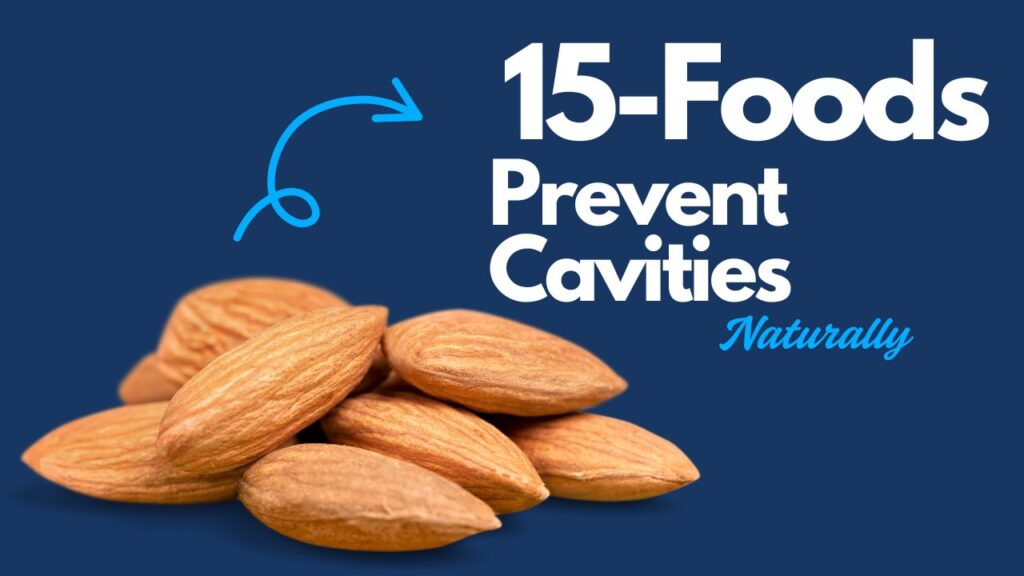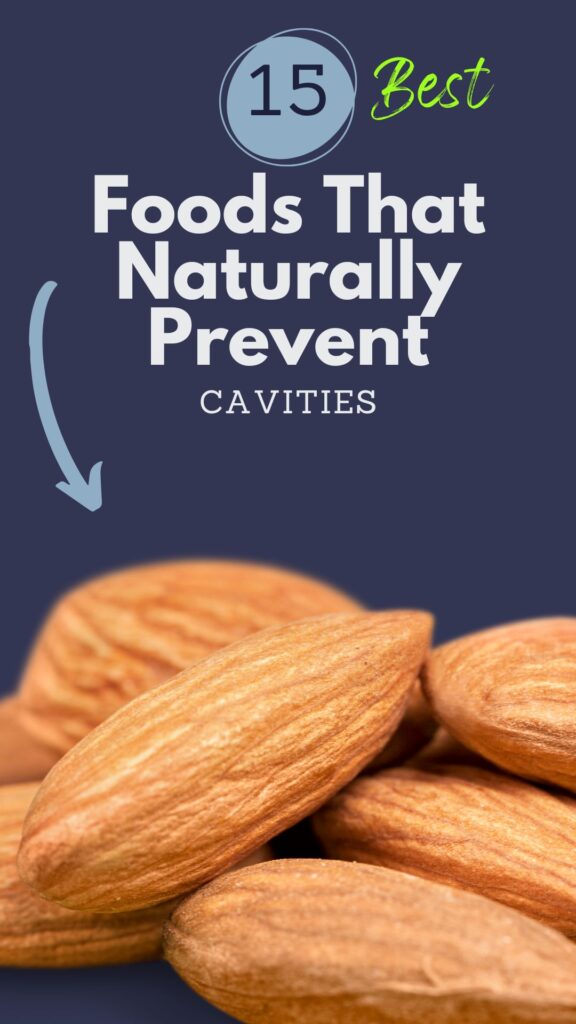Did you know that cavities are one of the most common chronic diseases in the world, even though they’re almost entirely preventable?
Dentists often stress brushing and flossing, but here’s a secret: what you eat plays just as big of a role in protecting your teeth.
Surprisingly, some everyday foods act as natural cavity-fighters, helping to strengthen enamel, balance oral bacteria, and even freshen breath.
This post explores 15 powerful foods that naturally prevent cavities. From crunchy fruits to dairy favorites, these foods aren’t just good for your body—they’re also a natural shield for your teeth.
Here’s what you’ll discover inside:
- The best foods for cavity prevention and how they work.
- Easy ways to add them to your meals and snacks.
- Who should eat (or avoid) them.
- Storage and buying tips to keep them fresh.
- Do’s & Don’ts to maximize their benefits.
- Possible side effects you should know.
Let’s dive in and see how simple food choices can keep your smile healthier and brighter.

Table of Contents

15 Best Foods That Prevent Cavities
1. Cheese
Cheese isn’t just a delicious snack—it’s one of the best foods for your teeth. Rich in calcium and casein, cheese helps strengthen tooth enamel and neutralize acids in the mouth.
Best Ways to Eat or Use It
- Snack on small cubes between meals.
- Pair with whole-grain crackers or fruits.
- Melt into omelets or add to salads.
Who Should Eat / Avoid
- Good for: kids, teens, and adults needing extra calcium.
- Avoid if: lactose intolerant or allergic to dairy.
Storage & Buying Tips
- Buy blocks instead of pre-shredded (fewer additives).
- Store in airtight wrap in the fridge.
- Use within 2–3 weeks.
Do’s & Don’ts
✅ Do: choose aged cheeses like cheddar or gouda for maximum cavity-fighting power.
❌ Don’t: eat highly processed cheese spreads with added sugars.
Possible Side Effects
- Overeating can add unnecessary calories and sodium.
2. Apples
There’s truth to the saying: “An apple a day keeps the doctor away.” Crunchy apples stimulate saliva flow, which helps wash away bacteria and food particles.
Best Ways to Eat or Use It
- Eat raw slices for a natural “toothbrush effect.”
- Add to salads or oatmeal.
- Blend into smoothies.
Who Should Eat / Avoid
- Good for: people looking for low-calorie snacks.
- Avoid if: you have acid reflux (the acidity may worsen symptoms).
Storage & Buying Tips
- Choose firm apples without soft spots.
- Store in the refrigerator to keep crisp longer.
Do’s & Don’ts
✅ Do: eat whole apples with the skin for fiber and nutrients.
❌ Don’t: rely on apple juice—it’s high in sugar and low in fiber.
Possible Side Effects
- Too much may contribute to acid erosion if consumed excessively.
3. Carrots
Carrots are natural cavity defenders. Their crunch cleans teeth surfaces while vitamin A supports gum health.
Best Ways to Eat or Use It
- Snack raw with hummus.
- Add shredded carrots to wraps or salads.
- Steam lightly for a softer texture.
Who Should Eat / Avoid
- Good for: kids, pregnant women, and anyone needing a vitamin A boost.
- Avoid if: you have certain digestive sensitivities.
Storage & Buying Tips
- Buy firm, brightly colored carrots.
- Store in the fridge wrapped in a damp paper towel.
Do’s & Don’ts
✅ Do: eat raw for maximum cleaning effect.
❌ Don’t: cook until mushy—it reduces crunch and nutrients.
Possible Side Effects
- Eating large amounts may cause temporary orange-tinted skin (carotenemia).
4. Green Tea
Green tea contains catechins, natural compounds that fight bacteria and reduce bad breath.
Best Ways to Eat or Use It
- Brew fresh green tea (unsweetened).
- Use as a base for iced teas.
- Add lemon for an antioxidant boost.
Who Should Eat / Avoid
- Good for: adults seeking a natural cavity shield.
- Avoid if: sensitive to caffeine or on certain medications.
Storage & Buying Tips
- Choose loose-leaf or high-quality tea bags.
- Store in a cool, dry place.
Do’s & Don’ts
✅ Do: drink without sugar.
❌ Don’t: rely on bottled green teas loaded with sweeteners.
Possible Side Effects
- Too much caffeine can cause restlessness or stomach upset.
5. Yogurt
Like cheese, yogurt is calcium-rich, but it also has probiotics that balance oral bacteria.
Best Ways to Eat or Use It
- Choose plain, unsweetened yogurt.
- Mix with fresh fruits and nuts.
- Use as a base for smoothies.
Who Should Eat / Avoid
- Good for: children, women, and gut health enthusiasts.
- Avoid if: lactose intolerant.
Storage & Buying Tips
- Buy small containers to avoid spoilage.
- Store in the fridge and use within 1–2 weeks.
Do’s & Don’ts
✅ Do: opt for Greek yogurt (higher in protein and calcium).
❌ Don’t: eat flavored yogurts packed with sugar.
Possible Side Effects
- Too much dairy can cause digestive discomfort in some people.
6. Almonds
Almonds are low in sugar but high in calcium and protein—perfect for strong teeth.
Best Ways to Eat or Use It
- Eat raw as a snack.
- Add to stir-fries or granola.
- Blend into almond butter.
Who Should Eat / Avoid
- Good for: vegans and those avoiding dairy.
- Avoid if: you have nut allergies.
Storage & Buying Tips
- Store in airtight containers.
- Keep in a cool, dry place to prevent rancidity.
Do’s & Don’ts
✅ Do: soak overnight for easier digestion.
❌ Don’t: overeat—nuts are calorie-dense.
Possible Side Effects
- May cause bloating or allergies in some individuals.
7. Leafy Greens (Spinach, Kale)
Packed with calcium, folic acid, and minerals, leafy greens protect teeth and gums.
Best Ways to Eat or Use It
- Toss into salads or smoothies.
- Steam lightly with olive oil.
- Use as a base for wraps.
Who Should Eat / Avoid
- Good for: pregnant women (folic acid).
- Avoid if: kidney stone risk (high oxalates).
Storage & Buying Tips
- Buy fresh, crisp leaves.
- Store in the fridge wrapped in a damp towel.
Do’s & Don’ts
✅ Do: mix with vitamin-C-rich foods to absorb iron.
❌ Don’t: leave washed greens sitting—use quickly.
Possible Side Effects
- Overeating can contribute to kidney stones in sensitive people.
8. Celery
Celery acts as a natural toothbrush, scraping food particles while boosting saliva.
Best Ways to Eat or Use It
- Snack raw with peanut butter.
- Chop into soups and stews.
- Add to smoothies.
Who Should Eat / Avoid
- Good for: anyone needing a low-calorie snack.
- Avoid if: you have digestive issues like IBS.
Storage & Buying Tips
- Choose firm stalks.
- Store in a bag with a bit of water in the fridge.
Do’s & Don’ts
✅ Do: eat raw for best dental benefits.
❌ Don’t: rely only on celery—it’s not nutrient-dense.
Possible Side Effects
- Excess intake may cause bloating.
9. Strawberries
Strawberries contain malic acid, a natural tooth whitener, and plenty of vitamin C.
Best Ways to Eat or Use It
- Eat fresh as snacks.
- Blend into smoothies.
- Slice into yogurt.
Who Should Eat / Avoid
- Good for: those needing antioxidants.
- Avoid if: allergic to berries.
Storage & Buying Tips
- Choose bright red, firm berries.
- Store in the fridge and eat within 2–3 days.
Do’s & Don’ts
✅ Do: rinse gently before eating.
❌ Don’t: dip in sugar or syrup.
Possible Side Effects
- Acidic, so rinse mouth after eating to avoid enamel erosion.
10. Water
It may sound simple, but water is the ultimate cavity fighter. It rinses away bacteria and balances pH levels.
Best Ways to Use It
- Drink plain throughout the day.
- Use fluoridated tap water if available.
Who Should Drink / Avoid
- Good for: everyone.
- Avoid if: none—water is safe universally.
Storage & Buying Tips
- Keep reusable bottles handy.
Do’s & Don’ts
✅ Do: sip after meals.
❌ Don’t: replace with sugary drinks.
Possible Side Effects
- Overhydration is rare but possible.
11. Oranges
Many people believe acidic fruits like oranges are bad for teeth, but in moderation, they actually help. Oranges are packed with vitamin C, which strengthens gums and blood vessels, keeping your mouth healthier overall.
Best Ways to Eat or Use It
- Peel and eat fresh as a snack.
- Add segments to salads.
- Drink freshly squeezed juice (without added sugar).
Who Should Eat / Avoid
- Good for: people needing immune support and gum protection.
- Avoid if: you suffer from frequent acid reflux, as citrus can worsen it.
Storage & Buying Tips
- Choose firm oranges with bright, smooth skin.
- Store at room temperature or refrigerate to keep fresh longer.
Do’s & Don’ts
✅ Do: rinse your mouth with water after eating citrus to reduce acid impact.
❌ Don’t: brush immediately after eating oranges—acid softens enamel temporarily.
Possible Side Effects
- Too much citrus may erode enamel or upset sensitive stomachs.
12. Garlic
Garlic isn’t just for flavor—it contains allicin, a compound with antibacterial properties that fight cavity-causing bacteria.
Best Ways to Eat or Use It
- Add minced garlic to stir-fries, soups, or roasted vegetables.
- Use raw garlic in dressings or spreads for maximum potency.
Who Should Eat / Avoid
- Good for: people looking to reduce oral bacteria naturally.
- Avoid if: you have garlic allergies or gastrointestinal sensitivities.
Storage & Buying Tips
- Choose firm, dry garlic bulbs.
- Store in a cool, dry place (not the fridge).
Do’s & Don’ts
✅ Do: crush garlic and let it sit a few minutes before cooking (boosts allicin release).
❌ Don’t: store peeled garlic too long—it loses potency quickly.
Possible Side Effects
- May cause bad breath or digestive irritation in some individuals.
13. Onions
Like garlic, onions contain antibacterial sulfur compounds that help reduce harmful bacteria in the mouth.
Best Ways to Eat or Use It
- Add raw onion slices to salads and sandwiches.
- Cook into soups, stews, or curries.
Who Should Eat / Avoid
- Good for: people who want natural antibacterial support.
- Avoid if: you experience strong breath sensitivity or stomach discomfort.
Storage & Buying Tips
- Select firm onions with dry outer skins.
- Store in a cool, dark place (away from potatoes).
Do’s & Don’ts
✅ Do: use raw onions occasionally for the strongest antibacterial effect.
❌ Don’t: rely only on cooked onions, as cooking reduces potency.
Possible Side Effects
- Can cause strong breath odor or digestive gas.
14. Black Tea
Black tea contains polyphenols that fight plaque-causing bacteria and reduce acid production in the mouth.
Best Ways to Eat or Use It
- Brew black tea hot and sip without sugar.
- Use chilled as a refreshing iced tea.
Who Should Eat / Avoid
- Good for: adults who want cavity protection with mild caffeine.
- Avoid if: caffeine-sensitive or prone to staining teeth easily.
Storage & Buying Tips
- Buy high-quality loose-leaf or tea bags.
- Store in an airtight container in a cool, dry place.
Do’s & Don’ts
✅ Do: rinse your mouth with water after drinking to prevent staining.
❌ Don’t: add sugar or flavored syrups.
Possible Side Effects
- Can stain teeth over time.
- Excess caffeine may cause restlessness.
15. Milk
Milk is one of the most complete foods for dental health. Its calcium, vitamin D, and casein proteins protect enamel and keep teeth strong.
Best Ways to Eat or Use It
- Drink a glass of milk with meals.
- Add to cereals, smoothies, or coffee.
- Use in cooking and baking.
Who Should Eat / Avoid
- Good for: children, athletes, and anyone needing calcium.
- Avoid if: lactose intolerant (opt for fortified plant-based alternatives).
Storage & Buying Tips
- Buy pasteurized milk with clear labeling.
- Store in the refrigerator and consume before the expiration date.
Do’s & Don’ts
✅ Do: drink plain milk for the best benefits.
❌ Don’t: rely on flavored milk—it often contains added sugar.
Possible Side Effects
- Some people may experience bloating or intolerance symptoms.
Conclusion
Cavity prevention isn’t just about brushing and flossing—it’s about creating a mouth-friendly diet that works with your oral health, not against it.
Here’s the recap of the 15 cavity-fighting foods you can start enjoying today:
- Cheese
- Apples
- Carrots
- Green Tea
- Yogurt
- Almonds
- Leafy Greens
- Celery
- Strawberries
- Water
- Oranges
- Garlic
- Onions
- Black Tea
- Milk
Each of these foods contributes to healthier teeth by strengthening enamel, balancing bacteria, increasing saliva, or delivering key nutrients. By making them part of your daily meals and snacks, you’re not just fueling your body—you’re protecting your smile for years to come.
Try adding one or two of these foods into your diet this week. You may notice fresher breath, stronger gums, and fewer cravings for sugary snacks.
Which of these foods do you already eat, and which are you excited to try? Share your thoughts or your favorite tooth-friendly recipe in the comments below!
Frequently Asked Questions (FAQs)
Can food alone prevent cavities?
No. While certain foods can naturally protect teeth, they should be combined with good oral hygiene (brushing, flossing, and regular dental checkups) for best results.
Which foods are the most effective for cavity prevention?
Dairy products like cheese and yogurt, fibrous fruits like apples, and cavity-fighting drinks such as green tea and water are some of the most effective.
Should I completely avoid sugary foods to prevent cavities?
Not necessarily. Small amounts of sugar are fine if consumed occasionally, but frequent sugar intake increases cavity risk. Always rinse or brush after eating sweets.
Do acidic fruits like oranges damage teeth?
Yes and no. Oranges provide vitamin C for gum health but can erode enamel if eaten in excess. It’s best to rinse your mouth with water after eating citrus.
How does green tea help with cavities?
Green tea contains catechins, natural compounds that reduce harmful bacteria in the mouth, lower acid levels, and freshen breath.
Can nuts like almonds really protect teeth?
Yes. Almonds are rich in calcium and protein, both essential for strong enamel, and they are naturally low in sugar.
Is drinking milk before bed bad for teeth?
It depends. Plain milk is fine, but flavored or sweetened milk can leave sugars on teeth overnight. Brushing after drinking milk at night is recommended.
Do onions and garlic really help dental health despite bad breath?
Yes. Both have antibacterial compounds that reduce cavity-causing bacteria. To counter bad breath, rinse your mouth or eat them with fresh herbs like parsley.
Can children eat all these cavity-preventing foods?
Most of them, yes. Dairy, fruits, and vegetables are excellent for children. Just be mindful of allergies (nuts, dairy) and choking hazards (whole nuts, raw carrots).
How much water should I drink to keep my teeth healthy?
Aim for at least 6–8 glasses per day. Sipping water throughout the day helps rinse away bacteria, balance pH, and keep your mouth hydrated.










